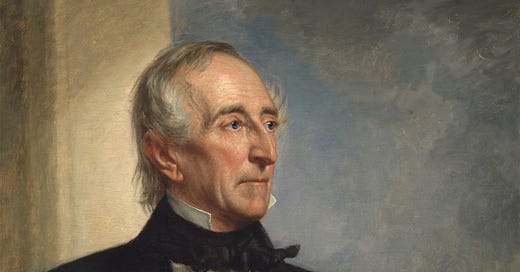When William Henry Harrison died a month after taking his oath of office, John Tyler became president. Or did he?
“In Case of the Removal of the President from Office, or of his Death, Resignation, or Inability to discharge the Powers and Duties of the said Office, the Same shall devolve on the Vice President,” said the Constitution. The vice president inherited the powers and duties of the president, but did he actually become the president?
John Tyler acted as though he did. Tyler was at his home in Williamsburg, Virginia, when he learned that Harrison had fallen ill. He decided not to rush to Washington lest he be seen as expecting Harrison's death. But after Harrison did die, Tyler hurried to the capital as quickly as he could.
Harrison's cabinet was not especially happy to see him. Daniel Webster as secretary of state was the senior member and a leader of the Whig party. The cabinet had taken to running the government during Harrison's illness, and Webster and the others weren't eager to relinquish their authority.
Especially not to John Tyler, a late arrival to Whiggism who retained some of the skepticism of government that had marked his days as a Jacksonian Democrat. Henry Clay, the Kentucky senator who led the Whigs in Congress, and the archrival of Jackson, supposed that Harrison's death would shift the power balance toward the legislative branch and allow full implementation of a robust Whig agenda. Clay treated Tyler as acting president only.
Tyler would have none of it. Upon reaching Washington, he enlisted a friendly judge to administer the presidential oath. He delivered an inaugural address. At his first cabinet meeting he was informed that President Harrison had been guided by a majority vote of the cabinet members. It was suggested that he follow the same practice. He refused. “I am very glad to have in my Cabinet such able statesmen as you have proved yourselves to be,” he said. "And I shall be pleased to avail myself of your counsel and advice. But I can never consent to being dictated to as to what I shall or shall not do. I, as president, shall be responsible for my administration. I hope to have your hearty cooperation in carrying out its measures. So long as you see fit to do this, I shall be glad to have you with me. When you think otherwise, your resignations will be accepted."
Clay tried to call what he hoped would be Tyler's bluff. He got Congress to pass legislation creating a new national bank and establishing a new protective tariff.
Tyler responded by vetoing the measures.
All the cabinet but Webster resigned. In those days parties were controlled by their congressional caucuses. Clay got the Whig caucus to excommunicate Tyler.
The move had no constitutional effect but amounted to a political death sentence. Tyler had abandoned the Democrats, and now the Whigs abandoned him, leaving him a man without a party just as the parties were securing a duopoly on national politics.
Tyler didn't allow his status as the lamest of lame ducks interfere with his conduct of the presidency. Through Webster he negotiated a treaty with Britain that resolved several issues in dispute with that country, and guided it through the Senate. He urged the annexation of Texas, and after Democrat James Polk was elected in 1844 on a pro-annexation platform, Tyler stole Polk's thunder by annexing Texas via congressional resolution.
After leaving office, Tyler eventually rejoined the Democratic party. His policy accomplishments as president had been modest, aside from the British treaty and Texas annexation.
Yet in one area he left an enduring mark on the presidency and American politics. By exercising the full powers of the presidency, including the veto, he erased any distinction between a president and an acting president. He demonstrated that who wielded the power of the presidency was the president.
Six presidents after Harrison died in office during the next dozen decades. Not once was the legitimacy of the vice presidents who succeeded them called into question. Finally in 1967 the 25th Amendment wrote the Tyler interpretation into the Constitution: “In case of the removal of the President from office or of his death or resignation, the Vice President shall become President.”
The lesson applies generally. Authority might be associated with a job title, but power is that which is grasped and exercised.




Great information as always. Especially timely as President Tyler’s last living grandson just died this past week at age 96 (https://www.wcvb.com/article/harrison-ruffin-tyler-john-tyler-grandson-dies/64925076)
Excellent article about a little-known president! Craig Sanders mentioned the very recent death of Tyler's last-living grandson. Another bit of trivia: Way back in the late 60s, when I was teaching at William & Mary University, one of my colleagues who was on sabbatical was the great--granddaughter of Tyler.